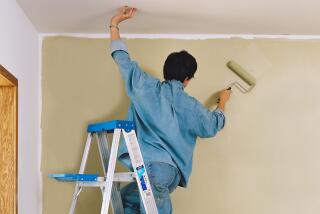Home’s Position May Be Reason for Misfortune
- Share via
Question: Friends of mine purchased a home about a year ago with plans to begin an extensive remodel before moving in. But after they began demolition, a neighbor whose view would be partly blocked persuaded the homeowners association to veto my friends’ architectural plans. Since then, they have been caught up in a very expensive lawsuit against the association in which they should be prevailing, but so far the judge seems to be ruling against them. They also have not been able to sell because of the demolition.
It is unlike them to be having the degree of misfortune they have been having since they bought this house. The house sits at the elbow of two straight streets coming together at a right angle, and I wonder if this might subject them to the so-called “poison arrows.” Furthermore, the house, as it stands now, shows only the garage to the street, with a somewhat hidden gate to an inner courtyard being the only type of front door barely visible.
If I am correct that there is some bad chi associated with this new house, can they be influenced by it even though they do not live in the house?
DALE DI STEFANO
Newport Beach
Answer: Absolutely. The position of the couple’s house is extremely unlucky just for the reason you suggest: It is receiving the constant negative energy of poison arrows. By being partially hidden, the front door also prevents prosperity and good luck (good chi) from entering the house. This home is in the grip of negative feng shui, and so are the unfortunate owners, despite the fact that they aren’t living there.
It’s possible, of course, that the homeowners association is correct in blocking the project and that your friends are fighting a losing battle for reasons that have nothing to do with feng shui. I can’t comment on that because I don’t know the facts of the case. But in the meantime, your friends have nothing to lose by trying to improve their luck with a few feng shui “fixes.”
I recommend placing a ba-gua mirror high up on the front of the house to deflect the poison arrows caused by the building’s position. Next, I suggest they hang delicate (not loud or clanging) wind chimes near the front door to attract and circulate chi at the entrance. If it’s possible to plant red tulips or other crimson flowers right outside the door, they should do so. Bright colors near the garage or gate would also be helpful in attracting chi and encouraging it to enter the home.
Know Significance of Animal Symbols
Q: I read recently that ceramics or paintings of wild animals should not be used in the home because this is dangerous. I’m an avid supporter of animal rights and collector of wildlife art, but to test the theory, I have temporarily removed all my beautiful tiger and lion ceramics. What is your opinion?
DINA TAKOURIS
Via e-mail
A: I believe you should surround yourself with things that you love and that make you feel powerful. It sounds as if your wildlife ceramics and paintings do just that.
The caution I would urge is that you be clear on what the animals represent and what your intent is in using these symbols. For example, the tiger is a fierce and powerful protector, but its raw strength and unpredictability should be respected. Placing your tiger art pieces on a western wall or corner of your home puts the animal in the sector that he governs, and the west is associated with creative power. Place the tiger on a west wall and see if your creativity and influence rise significantly over the next few weeks.
A new book by Angi Ma Wong called “Feng Shui Do’s and Taboos” contains a long list of good-luck symbols--from flowers to animals--and suggests how to put them to use for your goals. You might want to use this book to look up the various members of your animal collection.
Mirror Can Overcome Staircase Design
Q: Over the weekend I went house-hunting with a couple of friends. We saw a beautiful model home with everything in accordance with good feng shui except for interior stairs that lead right to the front door. I have found this a very bad feng shui arrangement. I had a personal experience with this same kind of design and know that it brings bad luck such as broken marriages and bankruptcy.
I urge you to write about this because these model homes are very much in demand, and people are unaware of the bad feng shui potential. Also could you give a remedy for homeowners who have already bought such a house?
FLORENCE DIEP
Via e-mail
A: It is indeed bad feng shui to have an inside staircase that runs straight down to the front door. Feng shui teaches that chi (good luck and prosperity) can’t circulate through a house with this architectural arrangement. I know that some major builders in the Southern California area have stopped building homes with the design in direct response to the increased awareness of feng shui. But apparently word has not spread to enough architects and developers.
There is a standard remedy for this unlucky staircase and door situation. Hang a mirror on the first landing of the staircase so that the mirror faces the front door. The mirror’s reflection will draw chi into the house, sending the energy spinning off in several directions and encouraging a healthy flow through the rest of the home.
You Can’t Close Door on Poor Bed Placement
Q: In your Feb. 6 column, you advised against placing the bed with the feet toward the doorway because this places the sleeper in the direct path of harmful chi. Our bed is in that location. You mention that the negative energy can be broken by placing a folding screen, a tall plant, chest, etc. at the foot of the bed, which would break the direct line of chi. Would simply closing the bedroom door gain the same result?
CAL PORTER
A: I’m afraid not. Closing the bedroom door might protect you from the constant bombardment of negative energy at night, but you would also forfeit the flow of gentle and beneficial chi around the room while you slept. Even more important, remember that symbolism is very powerful in feng shui. And the feet-out-the-door position still represents death, whether the door is open or closed.
Kirsten Lagatree is a New York City-area writer whose books include “Feng Shui, Arranging Your Home to Change Your Life” (Villard 1996) and “Feng Shui at Work, Arranging Your Work Space for Peak Performance and Maximum Profit” (Villard 1998).
Mail your questions on feng shui to Kirsten Lagatree, Real Estate section, Los Angeles Times, Times Mirror Square, Los Angeles, CA 90053, fax them to (213) 237-4712, or e-mail them to kfengshui@aol.com or Real.Estate@LATimes.com. All questions will be considered but cannot be answered individually.


